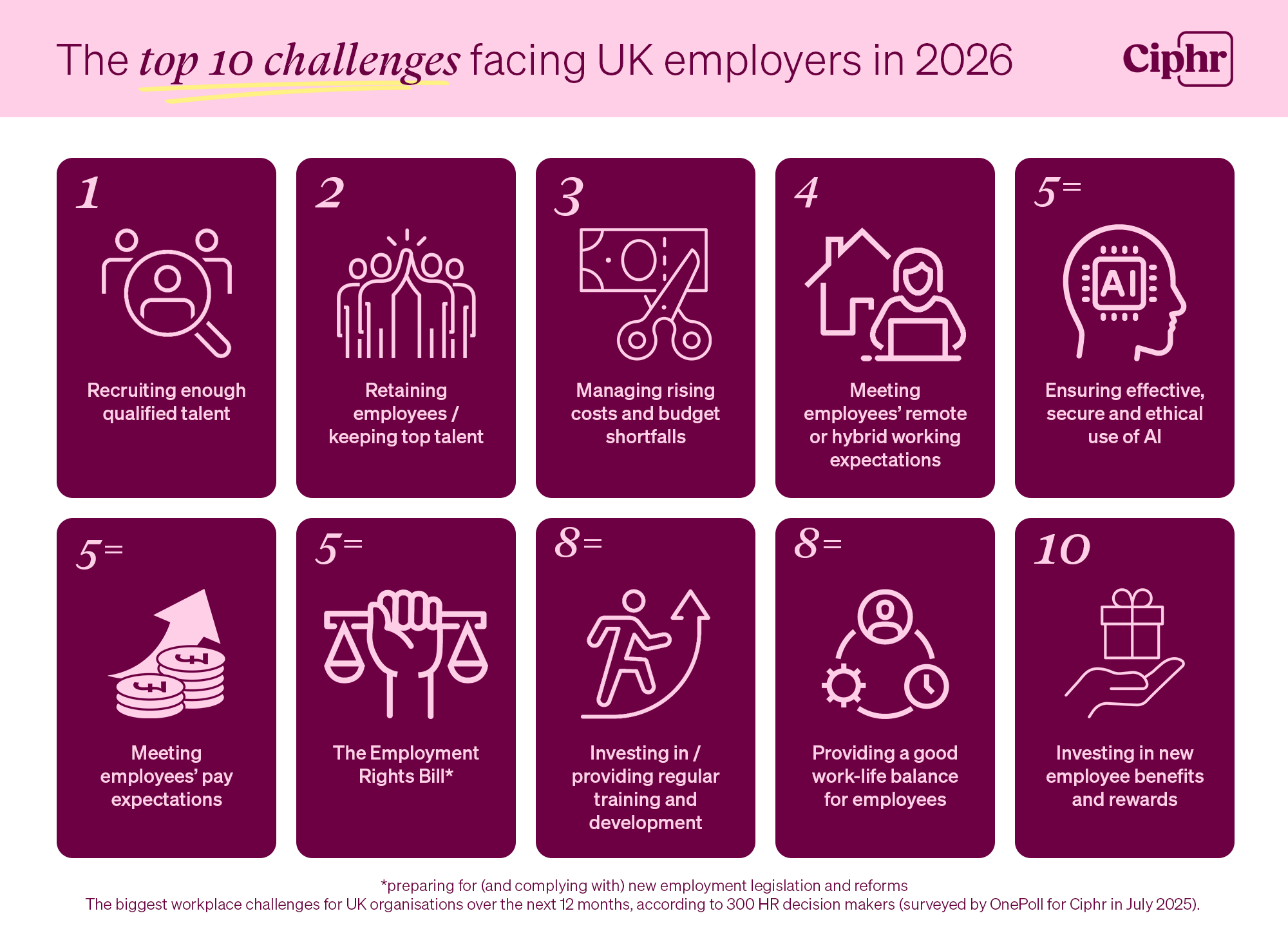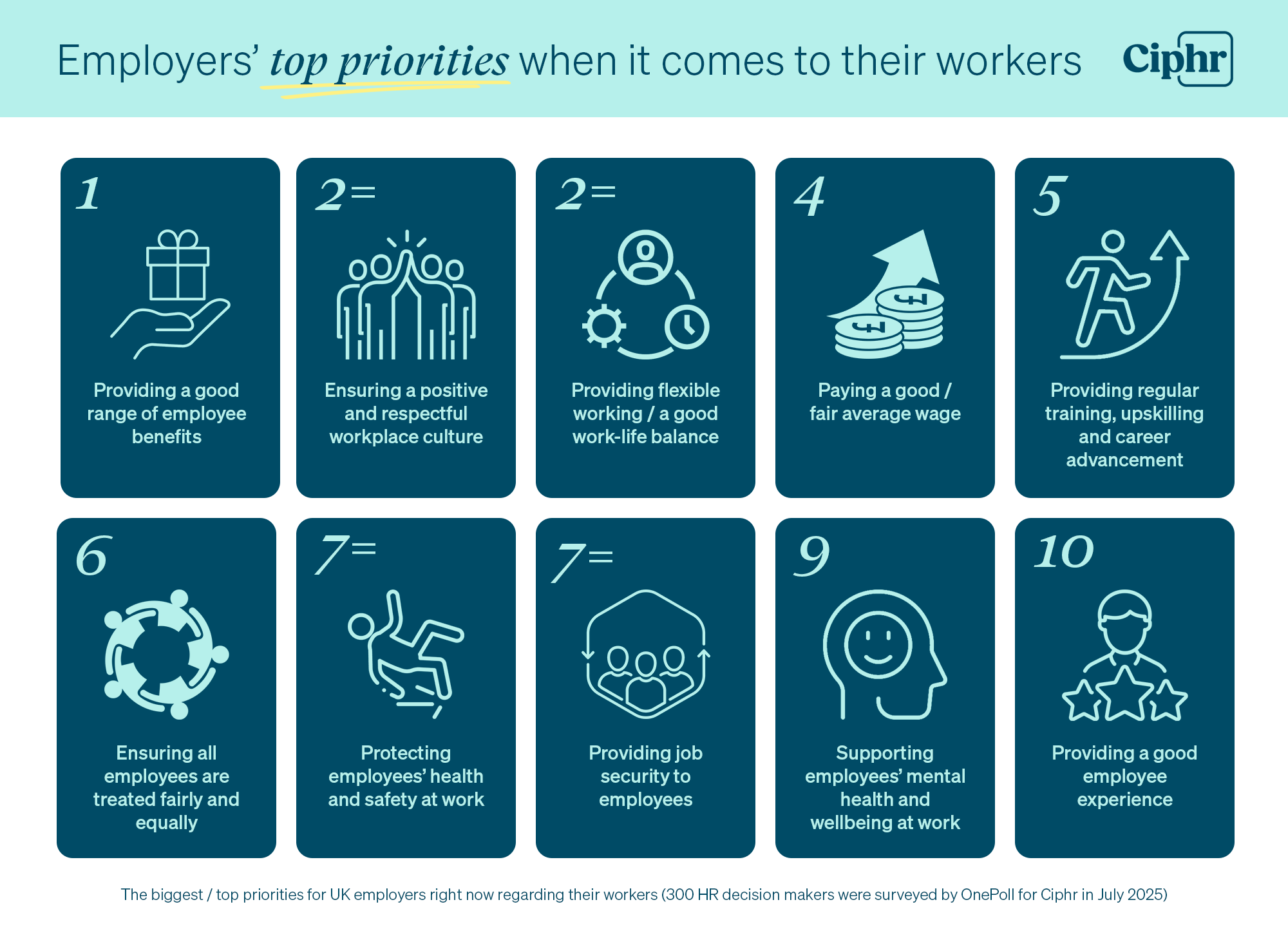Recruitment and retention remain key challenges for UK employers heading into 2026.
HR software provider Ciphr commissioned a survey of 300 UK-based HR decision-makers to find out which workplace challenges, if any, were causing their organisations the biggest concerns.
Ciphr’s research found that nearly a third (29%) of HR professionals think that recruitment is (or will be) the biggest challenge facing their organisation in the coming year.
Keeping/retaining skilled staff, managing rising costs, meeting employees’ remote or hybrid working expectations, and the responsible use of AI were also cited as key challenges by around a quarter of those polled.
Many employers are also contending with issues around satisfying their staff’s pay expectations (amid the cost-of-living crisis), preparing for the new Employment Rights Bill, and providing better work-life balance support.
Survey respondents were also asked to share their views on people-related business priorities for 2026. Having good employee benefits topped that list (selected by 46% of HR professionals). A similar number (nearly half or 45%) thought that employers should also prioritise providing a positive workplace culture and a good work/life balance.

Recruitment, retention and other big challenges in the year ahead
Most (96%) employers expect the next year to be challenging for their business in some way.
Ciphr's survey quizzed HR professionals about which factors, if any, they thought would be the biggest/most pressing workplace challenges facing their organisations over the next 12 months (up to July 2026).
Respondents were asked to multi-select any/all options (challenges) from the randomised list that they thought could impact their organisation. A ‘none of the above’ answer was also provided. On average, they cited five different challenges.
Based on our findings, the 10 most common challenges UK employers expect to face heading into 2026 are:
- Recruiting enough qualified talent (29% of surveyed HR professionals)
- Retaining employees/keeping top talent (28%)
- Managing rising costs/budget shortfalls (27%)
- Meeting employees’ remote or hybrid working expectations (26%)
- Ensuring effective, secure and ethical use of AI (25%)
- Meeting employees’ pay expectations (25%)
- The Employment Rights Bill – preparing for (and complying with) new employment legislation and reforms (25%)
- Investing in/providing regular and ongoing employee training and development opportunities (23%)
- Providing a good work-life balance for employees (23%)
- Ensuring a positive and inclusive workplace culture (22%)
- Investing in new employee benefits and rewards (22%)
↓↓ Keep scrolling down for the full results ↓↓
Revealed: the biggest workplace challenges for UK organisations in the year ahead
Chart showing the share of HR professionals who expect their organisation to find the following things challenging
Common challenges facing employers in different industries
Based on Ciphr’s survey findings, some of the types of challenges that organisations face vary depending on the industry they operate in. While most employers do share many common workplace challenges – such as recruiting enough staff, retaining talent, managing rising costs, keeping up with salary inflation, reducing workloads, and providing health and wellbeing support – some challenges affect some sectors more than others.
The biggest workplace challenges for employers in healthcare and social services, for example, is not recruitment or retention but supporting employees’ mental health and wellbeing at work, and prioritising diversity and inclusion initiatives (36% of HR professionals working in this sector think these will be the most challenging over the next 12 months).
The Employment Rights Bill and using AI were cited as the top two challenges for organisations in the science, technology, and research industries (35% and 34% respectively). Ensuring a positive and inclusive workplace culture is expected to be the biggest challenge for retail organisations (30%), while meeting pay expectations is a recurring problem for public services employers (40%). And for the transport and logistics sector, one of their biggest challenges (alongside recruitment and retention) is getting employees to attend the workplace more regularly, or for a mandated number of days (38%).
For more results, please see the chart below.
How HR professionals working in different sectors expect their organisations to be challenged in the year ahead
Click on any column to sort the results in ascending or descending order:
Employer's top priorities for their people in 2026
In our survey, Ciphr also asked respondents to share their views on the top priorities for employers when it comes to their workers.
The three priorities that topped their list were: offering good benefits and rewards, fostering a positive working culture, and providing flexible working to support a good life/work balance. Paying a fair salary and providing more training also ranked highly.
Here's what HR professionals think employers should be prioritising now to support their people over the coming year:
- Providing a good range of employee benefits (46% of surveyed HR professionals)
- Ensuring a positive, respectful and healthy work environment / culture (45%)
- Providing flexible working / a good work-life balance for employees (45%)
- Paying a good / fair average wage (42%)
- Providing regular employee training, upskilling opportunities, and career advancement (42%)
- Ensuring all employees are treated fairly and equally (41%)
- Protecting employees’ health and safety at work (40%)
- Providing job security to employees (40%)
- Supporting employees’ mental health and wellbeing at work (39%)
- Providing a good employee experience (39%)
- Maintaining good / meaningful in-person connections among employees (38%)
- Ensuring clear communication and transparency across the business (37%)
- Ensuring employees’ workloads are manageable (36%)
- Ensuring a diverse and inclusive workplace (35%)
- Showing appreciation for and recognition of employees’ work (34%)
- Ensuring leaders / bosses act ethically and accountably (30%)
- Providing remote and/or hybrid working (27%)
- Reducing any gender pay gaps to zero (25%)
- Providing occupational sick pay (21%)
- Encouraging the ‘right to disconnect’ outside usual working hours (19%)

Employers' priorities vary by organisation size
Larger employers (with over 1,500 employees) are more likely to prioritise providing job security (57%), while smaller employers (with less than 50 employees) think providing a healthy work environment is a bigger priority (40%).
Notes
Ciphr commissioned OnePoll to conduct an independent survey of 300 HR decision-makers (employed at UK organisations). The survey ran between 22-28 July 2025.
Over half (55%) of respondents are employed at SMEs in the UK with less than 250 employees (of those, 8% work at organisations with less than 50 employees). Two-fifths (45%) are at large organisations with over 250 employees (of those, 10% work at enterprises with 1,500+ employees).
Respondents were asked:
– Which, if any, of the following do you think will be the biggest/most pressing workplace challenges facing your organisation over the next year/12 months?
– In your opinion, which, if any, of the following are the biggest/top priorities right now for employers regarding their workers?
This infographic was published in October 2025. It replaced an earlier version published in April 2024.



-min.jpg?width=2121&height=1414&name=iStock-1413937269%20(1)-min.jpg)


-min.jpg?width=2121&height=1414&name=iStock-487814050%20(1)-min.jpg)





